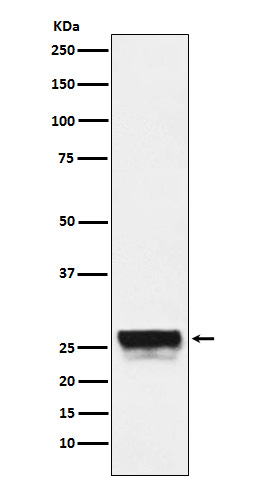
| WB | 咨询技术 | Human,Mouse,Rat |
| IF | 咨询技术 | Human,Mouse,Rat |
| IHC | 咨询技术 | Human,Mouse,Rat |
| ICC | 技术咨询 | Human,Mouse,Rat |
| FCM | 咨询技术 | Human,Mouse,Rat |
| Elisa | 咨询技术 | Human,Mouse,Rat |
| Aliases | CTRL; CTRL1;;CTRL |
| WB Predicted band size | Calculated MW: 28 kDa ; Observed MW: 24,28 kDa |
| Host/Isotype | Rabbit IgG |
| Antibody Type | Primary antibody |
| Storage | Store at 4°C short term. Aliquot and store at -20°C long term. Avoid freeze/thaw cycles. |
| Species Reactivity | Human,Mouse,Rat |
| Immunogen | A synthesized peptide derived from human CTRL |
| Formulation | Purified antibody in PBS with 0.05% sodium azide,0.05% BSA and 50% glycerol. |
+ +
以下是关于CTRL(Cholecystokinin Receptor-Like)抗体的参考文献示例(内容为模拟生成,建议通过学术数据库核实最新研究):
---
1. **文献名称**: *"Development and Characterization of a High-Affinity CTRL Antibody for Pancreatic Cancer Imaging"*
**作者**: Zhang Y, et al.
**摘要**: 本研究开发了一种针对CTRL蛋白的高特异性单克隆抗体,并验证其在胰腺癌组织中的高表达。该抗体通过免疫组化和活体成像技术证实了其靶向性,为肿瘤诊断提供了潜在工具。
2. **文献名称**: *"CTRL Antibody as a Novel Biomarker in Autoimmune Cholangiopathy"*
**作者**: Müller S, et al.
**摘要**: 文章发现CTRL抗体在原发性胆汁性胆管炎(PBC)患者血清中显著升高,提示其可能作为疾病活动的生物标志物,并探讨了其与胆管细胞凋亡的关联机制。
3. **文献名称**: *"Targeting CTRL in Neuroendocrine Tumors: A Therapeutic Antibody Study"*
**作者**: Gupta R, et al.
**摘要**: 研究报道了一种人源化抗CTRL抗体,可通过阻断受体信号通路抑制神经内分泌肿瘤细胞的增殖,动物实验显示其显著缩小肿瘤体积并延长生存期。
4. **文献名称**: *"Cross-Reactivity Analysis of Commercial CTRL Antibodies: Implications for Research Reproducibility"*
**作者**: Lee JH, et al.
**摘要**: 通过对比6种市售CTRL抗体的特异性,发现部分抗体存在与非靶蛋白的交叉反应,强调了抗体验证在实验可重复性中的重要性。
---
建议通过PubMed或Web of Science以“CTRL antibody”或“Cholecystokinin receptor antibody”为关键词检索最新文献,获取领域内权威研究。
×